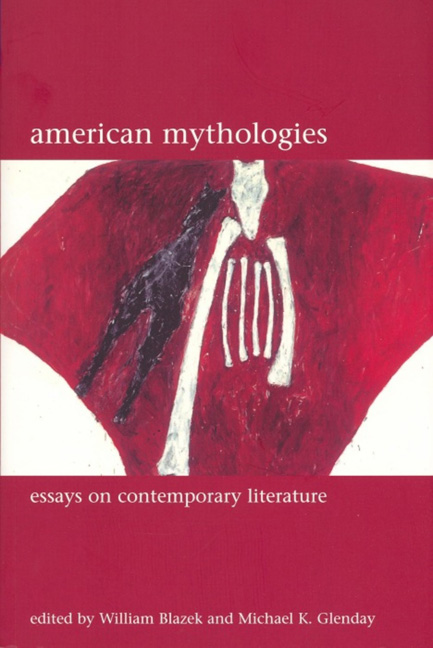Book contents
- Frontmatter
- Dedication
- Contents
- Acknowledgements
- Introduction
- 1 Indians with Voices: Revisiting Savagism and Civilization
- 2 Wild Hope: Love, Money and Mythic Identity in the Novels of Louise Erdrich
- 3 Float Like a Butterfly, Sting Like a Bee: Mythologies of Representation in Selected Writings on Boxing by Norman Mailer
- 4 The Secret Sharing: Myth and Memory in the Writing of Jayne Anne Phillips
- 5 The Individual's Ghost: Towards a New Mythology of the Postmodern
- 6 ‘Cheap, On Sale, American Dream': Contemporary Asian American Women Writers’ Responses to American Success Mythologies
- 7 ‘No Way Back Forever’: American Western Myth in Cormac McCarthy's Border Trilogy
- 8 Native American Visions of Apocalypse: Prophecy and Protest in the Fiction of Leslie Marmon Silko and Gerald Vizenor
- 9 The Brave New World of Computing in Post-war American Science Fiction
- 10 Mythologies of ‘Ecstatic immersion’: America, The Poem and the Ethics of Lyric in Jorie Graham and Lisa Jarnot
- 11 Whose Myth is it Anyway? Coyote in the Poetry of Gary Snyder and Simon J. Ortiz
- 12 Aging, Anxious and Apocalyptic: Baseball's Myths for the Millennium
- 13 Finding a Voice, Telling a Story: Constructing Communal Identity in Contemporary American Women's Writing
- Notes on Contributors
- Index
3 - Float Like a Butterfly, Sting Like a Bee: Mythologies of Representation in Selected Writings on Boxing by Norman Mailer
- Frontmatter
- Dedication
- Contents
- Acknowledgements
- Introduction
- 1 Indians with Voices: Revisiting Savagism and Civilization
- 2 Wild Hope: Love, Money and Mythic Identity in the Novels of Louise Erdrich
- 3 Float Like a Butterfly, Sting Like a Bee: Mythologies of Representation in Selected Writings on Boxing by Norman Mailer
- 4 The Secret Sharing: Myth and Memory in the Writing of Jayne Anne Phillips
- 5 The Individual's Ghost: Towards a New Mythology of the Postmodern
- 6 ‘Cheap, On Sale, American Dream': Contemporary Asian American Women Writers’ Responses to American Success Mythologies
- 7 ‘No Way Back Forever’: American Western Myth in Cormac McCarthy's Border Trilogy
- 8 Native American Visions of Apocalypse: Prophecy and Protest in the Fiction of Leslie Marmon Silko and Gerald Vizenor
- 9 The Brave New World of Computing in Post-war American Science Fiction
- 10 Mythologies of ‘Ecstatic immersion’: America, The Poem and the Ethics of Lyric in Jorie Graham and Lisa Jarnot
- 11 Whose Myth is it Anyway? Coyote in the Poetry of Gary Snyder and Simon J. Ortiz
- 12 Aging, Anxious and Apocalyptic: Baseball's Myths for the Millennium
- 13 Finding a Voice, Telling a Story: Constructing Communal Identity in Contemporary American Women's Writing
- Notes on Contributors
- Index
Summary
Introduction
At the end of 1984 African Americans held world titles in seventeen weight divisions from bantam to heavyweight. This dominance was particularly visible at the heavyweight level whose contests can still constitute the single most lucrative and celebrated event for the participants in modern mass sport. Muhammad Ali received $5,000,000 for his fight in Zaire against George Foreman in 1975 (and claimed that after tax and payments to his entourage, he would have $1,300,000 for himself.) Prior to Lennox Lewis, the last time a boxer other than an African American held the title was when Ingemar Johansson from Sweden captured the title from Floyd Patterson by a knockout in the third round of their 1959 bout at Yankee Stadium. Patterson regained the title in 1960 when he knocked Johannson out in the fourth round. Since then no ‘great white hope’ has succeeded in gaining the undisputed title of heavyweight champion of the world. Irish and Italian Americans, and more recently Hispanic Americans, all groups with strong pugilistic traditions, have challenged African American supremacy, but in the period under review the majority of contests have featured one African American against another. It can be argued that this African American supremacy would have emerged earlier if it had not been artificially prevented by the Jim Crow system of discrimination and segregation. This prevented African Americans from fighting whites in open official competition. Although African American fighters were occasionally matched with white boxers in private clubs and fairgrounds, a colour bar could be put in place in most states. It was not until 1908 that Jack Johnson became the first African American to win the heavyweight title. In the age of live satellite transmission, whether the stage was Caesar's Palace in the deserts of Nevada or under the open skies of Africa in the jungle surrounds of Kinshasa in Zaire, a massive global, multi-national, multi-cultural audience witnessed the continuous victory of the African American from Patterson to Holyfield.
- Type
- Chapter
- Information
- American MythologiesNew Essays on Contemporary Literature, pp. 47 - 62Publisher: Liverpool University PressPrint publication year: 2005

